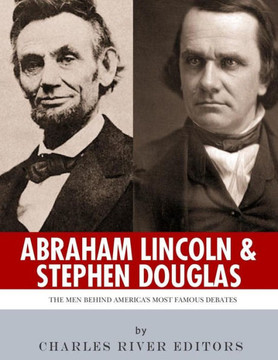*Explains the central issues of the debates, including the Missouri Compromise, the Kansas-Nebraska Act, popular sovereignty and the Dred Scott Decision, *Includes pictures of Lincoln, Douglas, and other important people. *Explains how the famous debates were conceived and planned. *Explains the importance of each debate with quotes of the candidates' speeches in each one. *Includes a Bibliography " I hold that New York had as much right to abolish slavery as Virginia has to continue it, and that each and every State of this Union is a sovereign power, with the right to do as it pleases upon this question of slavery, and upon all its domestic institutions." - Stephen Douglas "This declared indifference, but, as I must think, covert real zeal for the spread of slavery, I cannot but hate. I hate it because of the monstrous injustice of slavery itself. I hate it...especially because it forces so many really good men amongst ourselves into an open war with the very fundamental principles of civil liberty- criticizing the Declaration of Independence, and insisting that there is no right principle of action but self-interest." - Abraham Lincoln The most famous debates in American history were held over 150 years ago, and despite their fame, no official transcripts were ever taken. Throughout the Fall of 1858, U.S. Senate candidates Abraham Lincoln and Stephen Douglas participated in seven three-hour debates throughout Illinois. This unprecedented method of campaigning drew national attention, one that is still often idealized even today among those who feel politics is too bitterly partisan. The main theme of the debates was the topic being discussed across the nation: slavery. When Congress created the territories of Kansas and Nebraska in 1854, it allowed the citizens of those territories to vote whether the new states would be free states or slave states. This idea of allowing the citizens to vote was known as "popular sovereignty," and it was championed by the "Little Giant," Stephen Douglas. Casting himself as a moderate, Douglas believed popular sovereignty would not divide the nation, and thinking further ahead he believed slavery could not thrive in the Western territories because the land there was inhospitable to slave labor anyway. However, while Douglas viewed popular sovereignty as a more democratic means to solve problems, the North considered popular sovereignty a deliberate attempt to circumvent the Missouri Compromise, which was supposed to have banned slavery in any state above the parallel 36 30 north. While Lincoln recognized the right of states to maintain slavery where it already existed, he strongly opposed the expansion of slavery and argued forcefully against popular sovereignty, which he thought threatened to expand slavery across the entire nation. Douglas looked to blunt Lincoln's arguments during the debates by casting him as a radical "Black Republican," accusing him of advocating for the social and legal equality of the races. Though he opposed slavery on moral grounds, Douglas also wanted to deny citizenship to all African-Americans, which the Supreme Court had ruled in the Dred Scott case. In his rebuttal, Lincoln offered one of his most quotable moments: "I protest against the counterfeit logic which concludes that, because I do not want a black woman for a slave, I must necessarily want her for a wife. I need not have her for either, I can just leave her alone." The Lincoln-Douglas Debates chronicles the two candidates' famous debates, explaining the historical events that preceded the debates, the chronology and arguments of the debates, quotes from the candidates themselves, and the aftermath and legacy of the debates. Along with pictures of important people, places, and events, you will learn about the Lincoln-Douglas Debates like you never have before.
| Author: Charles River Charles River Editors |
| Publisher: Createspace Independent Publishing Platform |
| Publication Date: Feb 18, 2018 |
| Number of Pages: 132 pages |
| Language: English |
| Binding: Paperback |
| ISBN-10: 1985649500 |
| ISBN-13: 9781985649507 |

